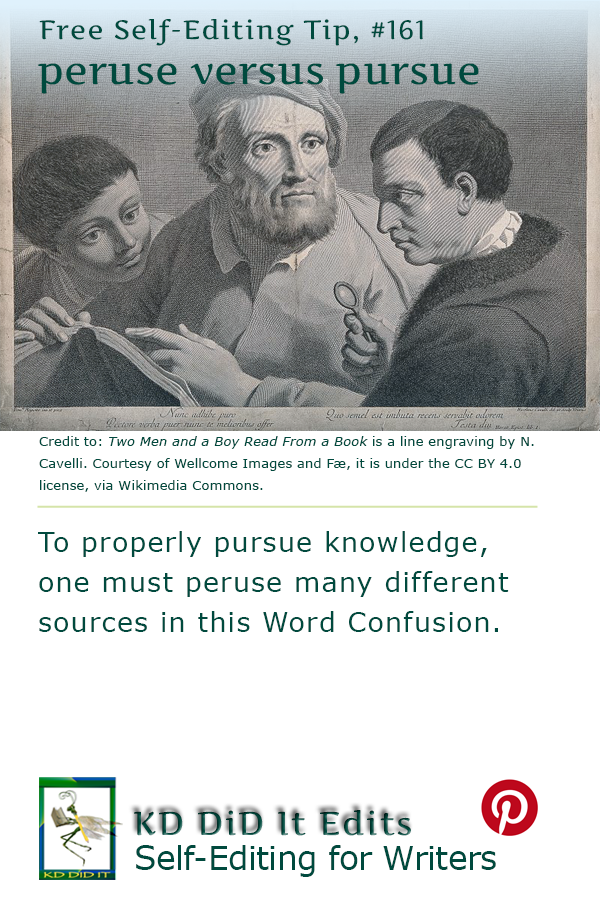Truly. I can understand why the hunter may want to peruse the prey, but my first thought would be that he (or she!) would pursue their prey, especially when speaking of tracking someone.
I gotta wonder if today’s writers spend too much time watching (or listening) to TV, radio, or stereo, that they don’t take the time to read. And preferably the older books. The ones that actually had editors who knew one word from another.
Oooh, now I’m getting catty. Must be all those perusable books I’ve been pursuing…and perusing.
Word Confusions…
…started as my way of dealing with a professional frustration with properly spelled words that were out of context in manuscripts I was editing as well as books I was reviewing. It evolved into a sharing of information with y’all. I’m hoping you’ll share with us words that have been a bête noir for you from either end. Consider sharing this Word Confusion with friends by tweeting it.
| Peruse | Pursue |
|---|---|
| Credit to: Apple Dictionary.com; Merriam Webster: peruse | |

Image by Elizabeth [CC BY 2.0], via Wikimedia Commons Kaitlyn peruses her book. |

Image courtesy of Winertai and is in the public domain via Wikimedia Commons A Taiwanese artwork of aborigines pursuing deer. |
| Part of Grammar: | |
| Verb, transitive
Third person present verb: peruses |
Verb, transitive
Third person present verb: pursues |
To examine or consider with attention and in detail
To look over or through in a casual or cursory manner Read (something), typically in a thorough or careful way
|
Verb, intransitive: To follow a fugitive, etc., in order to capture or overtake [Especially of something bad or unlucky] To follow closely or accompany To seek or strive to attain some object, desire, etc. Verb, transitive:
[Of a person or way] Continue or proceed along a path or route
|
| Examples: | |
| Laura perused a Caravaggio with all the attention of a hungry dog eyeing a steak.
He has spent countless hours in libraries perusing art history books and catalogues. I watched as he casually perused the titles in Tattered Cover. I used to get caught up in the encyclopedia; now, I peruse the Internet. It was his habit for Paul to peruse at least five newspapers over breakfast. |
Verb, intransitive: In The Fugitive, Tommy Lee Thompson pursued Harrison Ford. Ill health pursued her all her life. He pursued pleasure as a miser went after gold. Verb, transitive: A heavily indebted businessman was being pursued by creditors. Sophie was being pursued by a number of men. Should people pursue their own happiness at the expense of others? Mercy lasts as long as sin pursues man. The road pursued a straight course over the scrubland. Andrew was determined to pursue a computer career. The council decided not to pursue an appeal. We shall not pursue the matter any further. |
| Derivatives: | |
| Adjective: perusable, quasi-perusable Noun: peruser, perusal Verb: preperuse, reperuse |
Adjective: pursuable, unpursuable, unpursued Noun: pursuer, outpursue, repursue |
| History of the Word: | |
| Late 15th century in the sense of use up or wear out, perhaps from per- meaning thoroughly + use, but it does compare with the Anglo-Norman French peruser meaning examine. | Middle English originally in the sense of follow with enmity, which is from the Anglo-Norman French pursuer, from an alteration of Latin prosequi meaning prosecute. |
C’mon, get it out of your system, bitch, whine, moan…which words are your pet peeves?

